The Campers are finally here! After 10 months of waiting, the 2011 season has started off with a bang! Everyone arrived safely on Saturday and was introduced to their counselors and cabinmates. Saturday night we had our opening campfire and heard some music and stories from some of our most talented staff members. On Sunday, we jumped right into regular program with campers all over the fields, tennis courts, inter-art buildings and Echo Lake. On Monday night, we had some super fun evening activities including Egg Drop for Acadia and Baxter, ACFL and SHL combines for Apache and Sequoia and Sports Night Drafts for Bec and Bago. We can tell by all the Laurel smiles around camp that this summer is starting off just right!
Tag: Summer Camps 2011
Summers and Camp Belong in Maine…And So Do You!
Camp Laurel is a proud member of the Maine Camp Experience. We think Summers and Camp Belong in Maine…And So Do You! Enter to win a Maine Vacation by visiting the Maine Camp Experience website…just follow this link: www.mainecampexperience.com/visit.
Why Maine…
Lakes…Pine Forests…Even Moose
There’s a reason people talk about Maine in such reverential tones. The state has 2,200 lakes. Warm, inviting, crystal clear bodies of water that make most other lakes look like swimming holes. There are hundreds of thousands of acres of pine forests.
Temperate days and comfortable nights, where you feel you can touch the sky. And more miles of beautiful coastline than California. Even mountains — Mt. Katahdin is one of the highest peaks in New England. It’s the perfect setting for summer, one that can’t be matched anywhere.
Tradition
As Forbes noted, there’s something unique about summer camps in Maine. From our acres of prime waterfront to our unspoiled wilderness, Maine has been the only destination of choice for thousands of camp families, with friendships that stretch from generation to generation.
Our summer camps feature the finest facilities, the most sought-after staff and the most unique range of off-site trips. And with more than 100 Maine camps, there’s something to suit everyone.
Geographical Diversity
The lure of Maine extends way beyond the Northeast. Our campers come from throughout the U.S., some from all over the world. (More than 20,000 campers live in 30 states, and several countries!)
Your children will learn to stretch their boundaries and experience life through the eyes of someone whose life is not a mirror image of their own.
Easy To Get Here…Hard To Leave
Maine is a lot closer than you think. An easy drive or flight from most places in the Northeast– about the same distance as a winter ski trip. A great vacation for the entire family.
Whether you’re looking for the famed seaside resorts of Bar Harbor and Camden or a lodge on one of our pristine lakes, Maine has something for everyone — especially kids! Come and visit our Maine Camps and you’ll never want to leave.
We Can’t Wait For Campers to Arrive!
Camp is only hours away!!! Our staff spent the last couple of days unpacking, setting up cabins, making work wheels and nametags and getting each cabin and bed set just right so when campers arrive, they’ll feel right at home. Laurel Today is up and running so make sure you check out photos of Staff Orientation right on the Camp Laurel website. Everyone here is so excited for the Laurel Family to reunite once again! Safe travels to everyone this weekend. We can’t wait for you to get here!!
Camp Adventure Programs Help Campers Soar High
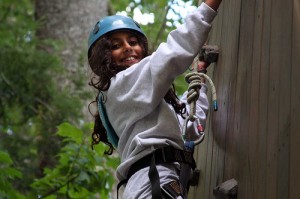 Anyone would feel a tremendous sense of accomplishment after scaling a forty foot wall and then whizzing down a zip line or perhaps, while attached to a harness of course, taking a giant leap of faith off a perch with a great view. But when the person is under the age of sixteen, the feeling is unmatched. This is the sense of elation that camp adventure programs bring to campers every summer. Adventure is one of the most popular programs at camp. But what’s the point of all that climbing, jumping, and zipping around you ask?
Anyone would feel a tremendous sense of accomplishment after scaling a forty foot wall and then whizzing down a zip line or perhaps, while attached to a harness of course, taking a giant leap of faith off a perch with a great view. But when the person is under the age of sixteen, the feeling is unmatched. This is the sense of elation that camp adventure programs bring to campers every summer. Adventure is one of the most popular programs at camp. But what’s the point of all that climbing, jumping, and zipping around you ask?
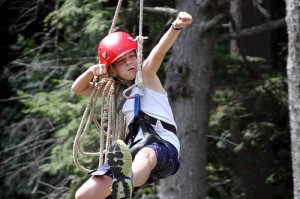 For starters, high and low ropes courses have been used for some time now as team building event, probably the most commonly known reason for their usage. In the case of a high ropes course, which is often at least thirty feet above ground and is sometimes as high as fifty, courage is one of the first words that comes to mind. Quite simply put, it takes a lot of courage to shimmy up a ladder or patiently work your way trial and error up a climbing wall and then attempt to maneuver across beams or rope of miniscule width with the ground looming below, even if one is safely secured to a harness and cables and spotted by trained professionals. Trust is really what high ropes courses are all about. A high ropes course challenges campers’ comfort levels and forces them to put trust in their fellow campers and camp staff, who also share in the inevitable sense of pride after successfully finishing a challenge.
For starters, high and low ropes courses have been used for some time now as team building event, probably the most commonly known reason for their usage. In the case of a high ropes course, which is often at least thirty feet above ground and is sometimes as high as fifty, courage is one of the first words that comes to mind. Quite simply put, it takes a lot of courage to shimmy up a ladder or patiently work your way trial and error up a climbing wall and then attempt to maneuver across beams or rope of miniscule width with the ground looming below, even if one is safely secured to a harness and cables and spotted by trained professionals. Trust is really what high ropes courses are all about. A high ropes course challenges campers’ comfort levels and forces them to put trust in their fellow campers and camp staff, who also share in the inevitable sense of pride after successfully finishing a challenge.
Low ropes courses, on the other hand, encourage team building. They feature such elements as webbed rope nets, trust falls and activities that 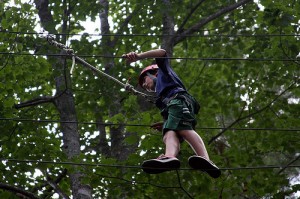 challenge participants to get their entire team between platforms by building a bridge, or to move from wide cables to narrow ones. More specifically, at camp, low ropes provide a great way for campers to bond with one another and encourage cabins to work together as a unit.
challenge participants to get their entire team between platforms by building a bridge, or to move from wide cables to narrow ones. More specifically, at camp, low ropes provide a great way for campers to bond with one another and encourage cabins to work together as a unit.
Nature programs also often compliment outdoor programs by helping campers reconnect with nature and understand the importance of preserving the environment. Fishing is another part of many outdoor adventure programs. While fishing is a perfect relaxing social opportunity, it’s also a great way of increasing children’s patience level.
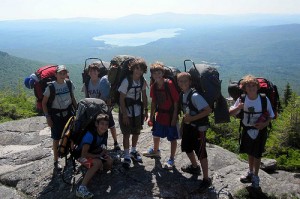 So it’s no wonder that these outdoor adventure programs are not popular merely for the lofty challenges that they provide, but for the thrill and sense of pride campers feel for having had the courage to accept and achieve them.
So it’s no wonder that these outdoor adventure programs are not popular merely for the lofty challenges that they provide, but for the thrill and sense of pride campers feel for having had the courage to accept and achieve them.
BECAUSE OF CAMP…
We could talk about the benefits of camp from now ’till the end of the summer.
But this month we’ll let the American Camp Association (ACA) do it for us.
Recently the ACA – an organization that educates leaders, ensures camp safety and accredits over 2,400 camps – created a short video. It ran in movie theaters across the country. Watch the video below:
In it, a number of celebrities highlighted their own camp experiences. Movie-goers learned that, because of camp…
- Emma Roberts made lasting friendships with people she still keeps in touch with.
- Hill Harper learned about self-esteem.
- Lisa Loeb plays guitar.
- Ashlan Gorse developed a personality. (Hey, that’s what she said.)
- Lisa Raye turned out just fine.
- And because of camp, actor Justin Chambers is sending his own kids to camp this summer.
For over a century, millions of other people have also been positively impacted by camp. For some, camp helped unearth a skill they never knew they had. Or fired a passion that is now their life’s work.
For others, camp built a lifetime of memories. Or introduced them to one lifelong friend.
Camp is many things to many people. It is what you make it – and what young peers and caring adults help you to be.
Because of camp, I am who I am today. And because of camp, I welcome you to join me in a summer experience that lasts forever.
Can’t wait to see you this summer.
Debbie Sollinger
Camp Laurel
Put on Your Swimsuits, Goggles, and Sunblock–It’s Time for a Swim!
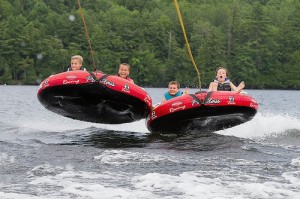 Almost every camper will name the Camp Laurel Waterfront as one of the best parts of camp. Camp Laurel is situated on a crystal-clear, spring-fed lake…measuring 9 miles around. Yes – 9 miles!!
Almost every camper will name the Camp Laurel Waterfront as one of the best parts of camp. Camp Laurel is situated on a crystal-clear, spring-fed lake…measuring 9 miles around. Yes – 9 miles!!
The Camp Laurel waterfront plays a crucial role during the summer, not only as a place for swimming, sailing, kayaking, waterskiing, crew, fishing, bumper-tubing, and snorkeling, but as a gathering place and perfect backdrop for special event and outdoor evening activities. Learning to swim at camp is a rite of passage. Perfecting swim skills provides a great foundation for building camp memories of sunny days spent at the waterfront.
Of course, there are the much acclaimed physical and mental benefits of learning to swim that we 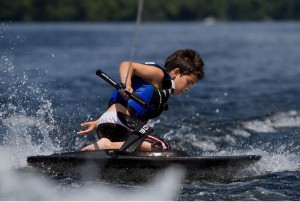 all know. It’s a great low impact exercise suitable for almost everyone, which makes it an ideal part of a regular fitness regime. It’s also not age-restrictive. Rather, it’s an activity that can be enjoyed for a lifetime. The fact that muscle strength is also greatly improved as a result of pushing oneself through the water goes without saying.
all know. It’s a great low impact exercise suitable for almost everyone, which makes it an ideal part of a regular fitness regime. It’s also not age-restrictive. Rather, it’s an activity that can be enjoyed for a lifetime. The fact that muscle strength is also greatly improved as a result of pushing oneself through the water goes without saying.
Swimming also improves coordination and emotional well being. The relaxing atmosphere of a hard-bottom lake provides the perfect setting for children to let down their guard and enjoy the type of casual conversation that builds and strengthens friendships. When combined with the sheer fun of the activity, it’s the perfect setting for building memories.
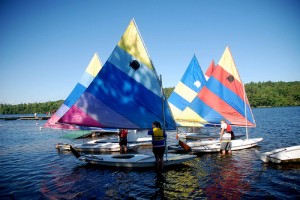 Camp waterfront locations are extremely active and full of almost endless possibilities for camper experiences. Camp Laurel has more than 60 boats: Mastercrafts Pro Start 197 Championship Ski Boats, Hobie Cats, Sunfish, Lasers, Fishing Pontoon Boats, Canoes, Kayaks, and more! The waterfront staff is well-trained with certified lifeguards who complete an extensive and rigorous training program prior to the start of camp.
Camp waterfront locations are extremely active and full of almost endless possibilities for camper experiences. Camp Laurel has more than 60 boats: Mastercrafts Pro Start 197 Championship Ski Boats, Hobie Cats, Sunfish, Lasers, Fishing Pontoon Boats, Canoes, Kayaks, and more! The waterfront staff is well-trained with certified lifeguards who complete an extensive and rigorous training program prior to the start of camp.
Camps also incorporate their waterfront areas into their special event planning. Water games and pirate-themed treasure hunts are just a couple of ways that water play is used creatively in camp programs.
Swimming at camp takes on a new level of excitement when included in camp activities such as 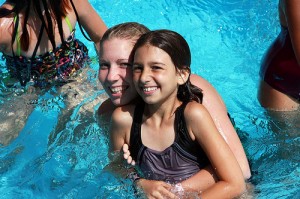 decathlons, apache relays and Spirit Days or College Days –that give campers the opportunity to use their swimming skills to rise to a challenge. Camp Laurel swimmers also compete in swim meets through inter-camp leagues. Whether racing against other campers or a time clock, being able to apply their swimming instruction in an engaging way and seeing firsthand how they’ve improved has been a moment of pride for many a camper.
decathlons, apache relays and Spirit Days or College Days –that give campers the opportunity to use their swimming skills to rise to a challenge. Camp Laurel swimmers also compete in swim meets through inter-camp leagues. Whether racing against other campers or a time clock, being able to apply their swimming instruction in an engaging way and seeing firsthand how they’ve improved has been a moment of pride for many a camper.
And don’t forget about the famous Maine Lakes Cup – a 14 camp sailing regatta which started at Camp Laurel and is hosted by the winning camp each summer.
So the next time your child regales you with tales of the waterfront at his or her summer camp, remember that it’s not just summer memories that they’re gaining from their swimming experiences, but lifelong skills.
Building Creativity Through Campfire
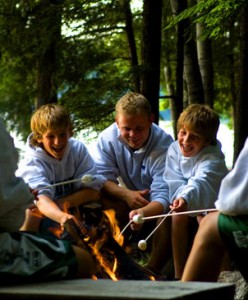 One of the most endearing and sacred parts of summer camp is the campfire. More than just wood lit with a match, it’s an intimate part of the camping experience that goes far beyond simply sitting around a fire. Each camp has a set of traditions uniquely connected to the campfire experience and, to campers, each tradition is significant, demanding reverence. The campfire is the very place where many children recall the moment when their camp transformed from “a camp” to “their camp”, where fellow campers and counselors become family while singing songs, roasting s’mores, and engaging in campfire activities. So intricate is the campfire to the summer camp experience that even former Disney CEO Michael Eisner has reflected on its importance in making him who he is:
One of the most endearing and sacred parts of summer camp is the campfire. More than just wood lit with a match, it’s an intimate part of the camping experience that goes far beyond simply sitting around a fire. Each camp has a set of traditions uniquely connected to the campfire experience and, to campers, each tradition is significant, demanding reverence. The campfire is the very place where many children recall the moment when their camp transformed from “a camp” to “their camp”, where fellow campers and counselors become family while singing songs, roasting s’mores, and engaging in campfire activities. So intricate is the campfire to the summer camp experience that even former Disney CEO Michael Eisner has reflected on its importance in making him who he is:
“Simply consider the lessons I was taught by the campfire…every time the rich reward was the same as we simply sat and enjoyed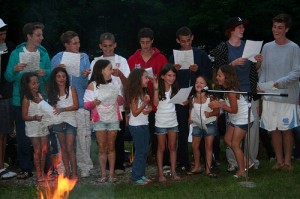 our consuming creation. And, there was one aspect in particular that never failed to intrigue me, and that was the process of seeing the single small flame of the match spread to the kindling and then the twigs and then the smaller branches and finally the larger logs. It didn’t dawn on me until years later, but this was the perfect metaphor for the creative process…Years later, I found myself running a network television division and then a movie studio and now an entire entertainment company. But, much of the success I’ve achieved can be traced to the direct and metaphorical lessons I learned in building those campfires.”
our consuming creation. And, there was one aspect in particular that never failed to intrigue me, and that was the process of seeing the single small flame of the match spread to the kindling and then the twigs and then the smaller branches and finally the larger logs. It didn’t dawn on me until years later, but this was the perfect metaphor for the creative process…Years later, I found myself running a network television division and then a movie studio and now an entire entertainment company. But, much of the success I’ve achieved can be traced to the direct and metaphorical lessons I learned in building those campfires.”
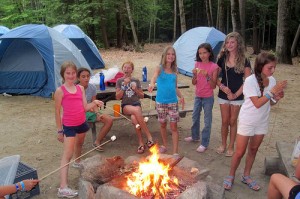 To some, to assign such significance to fire may seem a bit of a stretch. But to anyone who has attended camp, it’s not only believable but apt. Beyond Eisner’s metaphor, the campfire is symbolic of camp, and represents the bonding between campers and nature. Campfires instantly evoke feelings of togetherness and promote an atmosphere of being together in an intimate setting that is unique to the people who are present. Many camps hold opening and closing campfires to welcome campers and immerse them in the camping experience and to help them say goodbye at the end of the summer. At the beginning of the summer, the flames represent the birth of a new summer. Opening campfires often include some sort of ritual that introduces an idea or process that can be re-visited throughout the summer, such as setting goals for the summer or some sort of introduction and bonding activity with camp “siblings”. The meaning of the flames, however, transforms at the end of the summer. The burning of a closing campfire represents the end of the season. It’s a way to give the summer a proper and respectful send off. Campfires held throughout the summer supplement overnight camping trips and special events.
To some, to assign such significance to fire may seem a bit of a stretch. But to anyone who has attended camp, it’s not only believable but apt. Beyond Eisner’s metaphor, the campfire is symbolic of camp, and represents the bonding between campers and nature. Campfires instantly evoke feelings of togetherness and promote an atmosphere of being together in an intimate setting that is unique to the people who are present. Many camps hold opening and closing campfires to welcome campers and immerse them in the camping experience and to help them say goodbye at the end of the summer. At the beginning of the summer, the flames represent the birth of a new summer. Opening campfires often include some sort of ritual that introduces an idea or process that can be re-visited throughout the summer, such as setting goals for the summer or some sort of introduction and bonding activity with camp “siblings”. The meaning of the flames, however, transforms at the end of the summer. The burning of a closing campfire represents the end of the season. It’s a way to give the summer a proper and respectful send off. Campfires held throughout the summer supplement overnight camping trips and special events.
To say that the campfire breeds creativity is not only accurate, but understated. The various representations and meanings that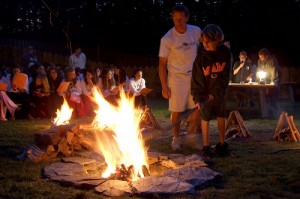 the actual fire itself takes on helps campers learn to look at the same thing from different angles, a crucial aspect of honing creative thought and learning to think “outside the box”, which is essential to developing good problem solving skills. When considered from this perspective, it’s not at all difficult to imagine a CEO of one of the world’s largest companies crediting much of his success to his camp experiences, specifically to the campfire. In fact, it provides insight about the significance of camp and how the lessons learned there can be carried throughout life.
the actual fire itself takes on helps campers learn to look at the same thing from different angles, a crucial aspect of honing creative thought and learning to think “outside the box”, which is essential to developing good problem solving skills. When considered from this perspective, it’s not at all difficult to imagine a CEO of one of the world’s largest companies crediting much of his success to his camp experiences, specifically to the campfire. In fact, it provides insight about the significance of camp and how the lessons learned there can be carried throughout life.
Summer Camp: Curbing Childhood Obesity
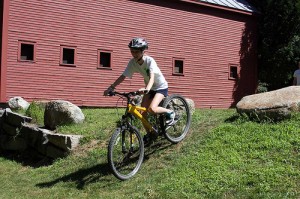 With the Center for Disease Control and Prevention (CDC) reporting that nearly 1 in 5 children between the ages of 6 and 19 is obese, it has become imperative that we, as parents, make as much effort to set our children up for success in establishing proper food habits, just as we would in other areas of their lives. Three primary causes consistently cited for childhood obesity are lack of physical activity, an unbalanced diet and overeating. An often overlooked benefit to summer camp is the significant impact it has in curbing childhood obesity by promoting an active lifestyle and healthy eating practices. In this multi-part series, we will examine the efforts being made by summer camps to battle poor diet and exercise.
With the Center for Disease Control and Prevention (CDC) reporting that nearly 1 in 5 children between the ages of 6 and 19 is obese, it has become imperative that we, as parents, make as much effort to set our children up for success in establishing proper food habits, just as we would in other areas of their lives. Three primary causes consistently cited for childhood obesity are lack of physical activity, an unbalanced diet and overeating. An often overlooked benefit to summer camp is the significant impact it has in curbing childhood obesity by promoting an active lifestyle and healthy eating practices. In this multi-part series, we will examine the efforts being made by summer camps to battle poor diet and exercise.
Part I. Physical Activity
Beyond traditional summer camp sports such as soccer, basketball, baseball, roller hockey and 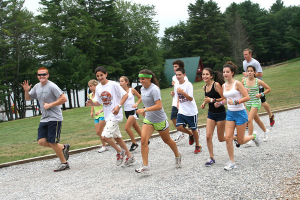 gymnastics, many camps are increasingly focusing on the development of extensive programs for such popular fitness activities as spin, running, weights, zumba, yoga and the martial arts. The instant popularity of these programs suggests that children have a natural interest in exercise and will engage in it of their own accord in the absence of many of the daily distractions that promote a more lethargic lifestyle but are not readily available at summer camp, such as computers, video game systems and television. The ability to participate in fitness programs as a form of fun also encourages campers to approach such activities with an open mind rather than as something forced on them and that is only done out of necessity.
gymnastics, many camps are increasingly focusing on the development of extensive programs for such popular fitness activities as spin, running, weights, zumba, yoga and the martial arts. The instant popularity of these programs suggests that children have a natural interest in exercise and will engage in it of their own accord in the absence of many of the daily distractions that promote a more lethargic lifestyle but are not readily available at summer camp, such as computers, video game systems and television. The ability to participate in fitness programs as a form of fun also encourages campers to approach such activities with an open mind rather than as something forced on them and that is only done out of necessity.
Some camps are also experimenting with nutrition programs that marry cooking activities with fitness. Such programs teach campers how to plan healthy meals and snacks and then prepare them. Cooking programs are among the most popular at summer camp. To merge them with nutrition is a clever way to demonstrate the importance of using discretion in choosing what we eat and consuming it in moderation. In the past, the idea of “diet,” as in depriving oneself of necessary nutrients, has been cited as a contributing factor in the growth of eating disorders and yo-yo dieting.
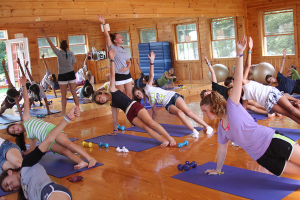 For those who question the lasting effects of fitness and nutritional habits adapted at summer camp, statistics indicate that they won’t be going away anytime soon. According to the American Camp Association, more than half of children who pursue a new interest at camp will continue pursuing that interest once they return home.
For those who question the lasting effects of fitness and nutritional habits adapted at summer camp, statistics indicate that they won’t be going away anytime soon. According to the American Camp Association, more than half of children who pursue a new interest at camp will continue pursuing that interest once they return home.
Up next, part II. An Unbalanced Diet
A Summer Full of Adventure
Few people think of finding a summer job while bundled in scarves, coats, and gloves as they attempt to maneuver roadways and college campuses after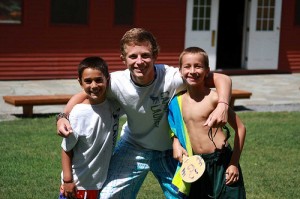 the latest snowfall. However, whether 2011 is the first time you’re considering a summer camp position or you’re a seasoned veteran, February is exactly the time to start the process of securing summer employment, if you haven’t already done so. Many camps attend campus recruiting fairs in order to assemble the perfect staff. So why should you attend one of these fairs or complete an online application now? To begin with, a camp job is definitely fun, but also a lot of work…so be prepared! Where else can you get paid to play all day while building valuable job skills? Whether you work in a specific area and focus on a sport, activity or hobby you love or you work as a counselor who travels from activity to activity with campers, your day is full of exciting challenges and a probably even a few surprises, both of which will develop your problem-solving, critical thinking, and negotiation skills.
the latest snowfall. However, whether 2011 is the first time you’re considering a summer camp position or you’re a seasoned veteran, February is exactly the time to start the process of securing summer employment, if you haven’t already done so. Many camps attend campus recruiting fairs in order to assemble the perfect staff. So why should you attend one of these fairs or complete an online application now? To begin with, a camp job is definitely fun, but also a lot of work…so be prepared! Where else can you get paid to play all day while building valuable job skills? Whether you work in a specific area and focus on a sport, activity or hobby you love or you work as a counselor who travels from activity to activity with campers, your day is full of exciting challenges and a probably even a few surprises, both of which will develop your problem-solving, critical thinking, and negotiation skills.
If you like working with children and aspire to a career in a field such as education, sports training, psychology or sociology, then you already have another reason to work at a camp. Camp is an excellent place to gain valuable experience and is impressive on a resume. Although camp seems lighthearted–and it is in many ways–working at camp requires a lot of responsibility, flexibility, and adaptability, all of which are very valuable characteristics sought by employers. Each day guarantees new challenges, many of them unexpected. Summer camp is often organized chaos. Yes, there is always a plan in place, but the unexpected is also inevitable. While this may seem scary the first couple days, it also brings an excitement and satisfaction that delivering pizzas or serving food (or even working at an investment bank) never could. Working at camp also requires a lot of communication and interpersonal interaction, two more transferrable skills that are highly valued by 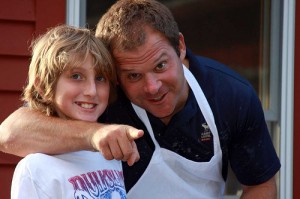 employers. At camp, you must effectively co-exist with your campers, co-counselors, and other staff members to be successful. You will also be able to tell future employers that you worked with people from all over the world and from many different socio-economic backgrounds. That you’ve overcome cultural, language, and social obstacles with others tells recruiters that diversity is not something you fear, but rather embrace.
employers. At camp, you must effectively co-exist with your campers, co-counselors, and other staff members to be successful. You will also be able to tell future employers that you worked with people from all over the world and from many different socio-economic backgrounds. That you’ve overcome cultural, language, and social obstacles with others tells recruiters that diversity is not something you fear, but rather embrace.
Working at summer camp can also be very healthy for your bank account. You won’t become Donald Trump spending your summers at camp. However; camps provide housing and food in addition to a salary. It’s possible to live virtually expense-free for a couple of months. Many summer camp counselors take home all or most of their salaries at the end of the summer.
Finally, you will form lifelong friendships at camp. You may arrive alone and nervous in June, but you will leave in August with literally hundreds of friends from all over the world. Two months may not seem like a long time, but when one lives and works in close proximity with co-workers, it’s more than sufficient to form bonds that ordinarily would take years. There are always tears on the last day of camp, not only when saying goodbye to your campers, who will have secured a special place in your heart forever, but to co-workers—the ones you know you will see again as well as the ones you know you will not. Regardless, the world will seem like a much smaller place to you.
Though it may seem early to begin planning such a special adventure with so many possibilities, building a successful camp staff not only requires 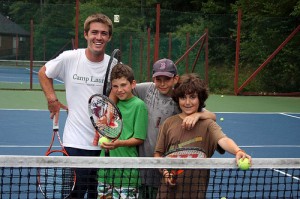 individuals who possess all of the qualities previously mentioned, it requires finding the right mix of personalities and talents. Such an endeavor, of course, takes time. Camp recruiters review literally thousands of applications each year and speak with hundreds of candidates to find those who are the best fit for their camp’s atmosphere, philosophy and program. Starting your job search while the ground is still white and the tree branches still bare provides you with the advantage of a larger pool of positions from which to choose. By April, most camps have nearly completed their hiring and only difficult to fill or highly specialized roles remain.
individuals who possess all of the qualities previously mentioned, it requires finding the right mix of personalities and talents. Such an endeavor, of course, takes time. Camp recruiters review literally thousands of applications each year and speak with hundreds of candidates to find those who are the best fit for their camp’s atmosphere, philosophy and program. Starting your job search while the ground is still white and the tree branches still bare provides you with the advantage of a larger pool of positions from which to choose. By April, most camps have nearly completed their hiring and only difficult to fill or highly specialized roles remain.
So, after a winter of wading through piles of snow, are you ready for a summer full of adventure?
Feeling Groovy at Camp–Now and Then!
 When I think about “camp songs,” I immediately think about singing around campfires, but each year at camp also has a distinct popular music soundtrack. Recently, campers weighed in on Twitter about the tunes that remind them of past summers and that got me thinking about what the United States and camp was like in the 1960s and 1970s.
When I think about “camp songs,” I immediately think about singing around campfires, but each year at camp also has a distinct popular music soundtrack. Recently, campers weighed in on Twitter about the tunes that remind them of past summers and that got me thinking about what the United States and camp was like in the 1960s and 1970s.
Hadley Hury remembers You’re A Good Man Charlie Brown (1969) and Music Man and the Counselors’ Show from 1970. That’s also when Charlie Ziff was theatre director, Hadley was assistant director and Jay Newman had the job of radio director for The Fantastiks. 1969 was the year that campers watched the moonwalk on television in the theatre and there was lots of talk about some “big thing going on in some little town called Woodstock!”
Bobby Brickman says he has vivid memories that revolve around people who played lead roles in productions of Brigadoon in 1961, Carousel in 1963, and Bye Bye Birdie in 1963. It’s clear that for a very long time, camp has been the place to put creativity and passion into great performances!
Barbara Gough adds that when she hears the captivating bass line of “Reach Out of the Darkness” by Friend and Lover, she’s immediately transported back to 1968. Friend and Lover was a one hit wonder and their song ranked in the Top Ten during 1968 when Barbara says campers “danced to this playing on the jukebox in the Canteen all summer long!” The song embraced social change with lyrics like “I think it’s so groovy now, That people are finally getting together. . .Reach out in the darkness. . .And you may find a friend.”

Back then, while campers made friends and memories, things in the United States as a whole were not so peaceful. When students in California held a Selective Service sit-in, 3,000 of them were arrested and housed in the San Francisco 49ers’ old football stadium. A promo man got a sound truck and started broadcasting “Reach Out of the Darkness” towards the students. That’s what started the song’s rise up the charts—and why campers miles away listened to the hit that summer!
The historical events of those times grounded the more multicultural and open society we have today, but during the 1960s, many people felt uncertain as to what the future held. In 1968, when Martin Luther King Jr. was assassinated, “Reach Out in the Darkness,” rocketed up the charts and like other big hits that year, captured the country’s changing mood. Songs that also ranked in 1968 include the Rascals’, “People Got to Be Free,” Simon & Garfunkel’s “Mrs. Robinson,” The Beatles’ “Hey Jude,” James Brown’s “Say It Loud–I’m Black and I’m Proud,” and versions of “I Heard It Through the Grapevine” by Gladys Knight and the Pips and Marvin Gaye.
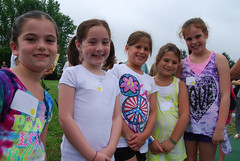
Summer camp is always a microcosm of our world-at-large where campers practice and learn skills for negotiating the world, where assumptions can be challenged, and where diverse people find ways to celebrate community and appreciate each other. One great thing about camp is that for a few weeks, the world grows a little smaller and everyone listens to the same soundtrack. In a fast-paced and interconnected world, camp “sounds” like the perfect place for connecting with others and as Hadley says, every summer adds up to “good times for campers and staff.” It’s often only later that campers realize how much the experience has shaped them and the way they see the world–much like how hit songs can illuminate the past in retrospect. The music (and fashions) may change through the years, but the core camp experience is never goes out of date.
We’d love to hear about how your time at camp contributed to your understanding about others as well as what you’re looking forward to most this summer!
Thanks for the image Cre8iveDoodles ~*~ New Beginnings!



